
Prayers up: It’s quarterly earnings day, and the mood around Google has presumably been dark ever since the company mournfully announced that it was going to ban journalism in California if the legislature forces the company to pay journalists for the work it profits from.
You have to imagine the crushing psychological impact of that kind of decision on a tech executive. Think of it: The democracy around us is in peril. Conspiracy theories abound. The availability of quality news sources are at an all-time low as newsrooms (worryingly, lately including nonprofits and public media) undergo waves and waves and waves of journalist layoffs principally caused by the collapse of advertising revenues, which got hoovered up, by… um…
You are Google! Portal of all knowledge to the free world! Devastatingly, after previously apparently lying to the face of a state senate committee chair, you must now threaten to crush local journalists and small publishers “until there’s clarity on California’s regulatory environment,” writes Google’s vice president of global news partnerships Jaffer Zaidi of the California Journalism Preservation Act:
“As we’ve shared when other countries have considered similar proposals, the uncapped financial exposure created by CJPA would be unworkable. If enacted, CJPA in its current form would create a level of business uncertainty that no company could accept. To prepare for possible CJPA implications, we are beginning a short-term test for a small percentage of California users. The testing process involves removing links to California news websites, potentially covered by CJPA, to measure the impact of the legislation on our product experience.”
Zaidi added: “If passed, CJPA may result in significant changes to the services we can offer Californians and the traffic we can provide to California publishers.”
As an English major, I always appreciate, on an aesthetic level, modal verbs like may and can when they emerge from the mouth of an executive issuing a threat. They signify possibility, potentiality — just a hint of wonderment at the unknown, the thrilling variety of life. Modal verbs can also express conditionality, like it would be a shame if anything happened to your little store. Even the little words are beautifully complex when we stop to appreciate them.
But: Google is sad! The regulatory uncertainty! The uncapped financial exposure! It’s all having a major impact on the business of Google’s parent company Alphabet, according to Reuters’ report on the latest earnings:
Alphabet announced its first-ever dividend on Thursday and a $70 billion stock buyback, cheering investors who sent the stock surging nearly 16% after the bell.
Oops, I quoted the wrong part of the piece about the uncertainty CJPA may have been creating with regard to what Google can offer California. Here:
In a call to discuss results, CEO Sundar Pichai touted Google's AI offerings as a boon to its core search results. "We are encouraged that we are seeing an increase in search usage among people who are using the AI overviews," he said.
Revenue was $80.54 billion for the quarter ended March 31, compared with estimates of $78.59 billion, according to LSEG data.
Look, when you have to destroy the old barter of hyperlinks as the passageway by which people consume knowledge across an increasingly AI-dominated web, you need investors behind you, and that $70 billion stock buyback for investors is not going to fund itself.




🖕Google.